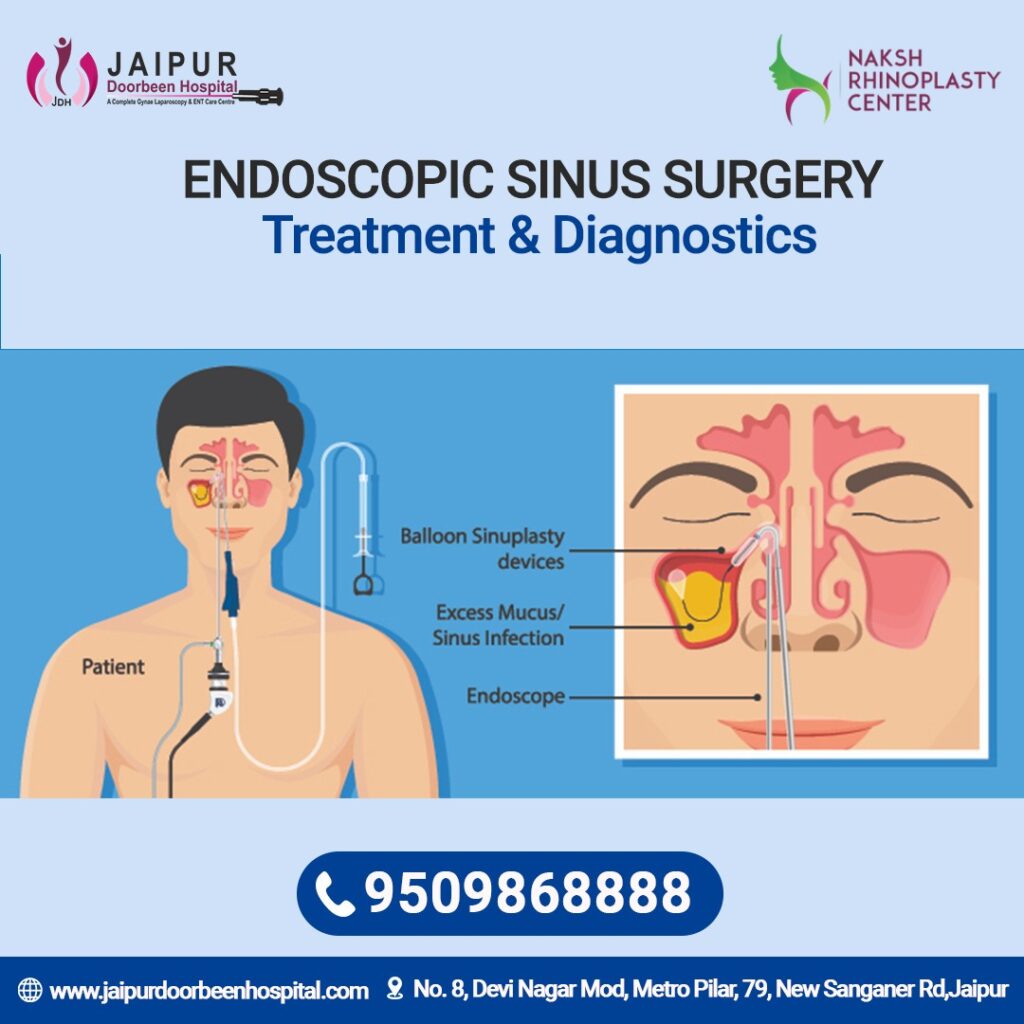ENDOSCOPIC SINUS SURGERY
Infection that persists for a very long time with inflammation caused in the lining of the nose and sinuses can cause chronic sinusitis. Some common symptoms that chronic sinusitis patients face are pressure on the face, post-nasal drip, nasal discharge discoloration, and nasal congestion. Doctors treat most patients suffering from sinusitis with medication. However, for some sinus patients, medicines do not work, And in turn, this results in nasal secretions getting trapped in the sinuses and becoming chronically infected.

What is meant by Endoscopic Sinus Surgery?
Endoscopic Sinus Surgery is a surgical method that helps to open the paths of the sinuses and aims to reinstate their functioning. There is inflammation of the narrow drainage pathways in chronic sinusitis. In this condition, the sinuses cannot drain properly. This causes nasal secretions to become trapped in the sinuses and result in chronic infection.
The thin and soft bone and mucous membranes in the nose are removed by doctors in Endoscopic Sinus Surgery to unblock the drainage pathways of the sinuses. Endoscopic is a term used to describe a small fiber-optic telescope used for surgery. This is inserted by doctors through the nostrils without any need for skin incision.
You should book a consultation and visit your doctor at Jaipur Doorbeen Hospital in Jaipur if you are facing any of these issues.
- Fever
- Nasal discharge
- Nasal congestion
- Facial pain
If any of these symptoms last longer than ten days or keep reappearing, you should book an appointment in Jaipur immediately.
How to prepare for endoscopic surgery?
- The doctor typically requests that the patient undergo some tests. Performing these tests in advance is necessary before coming for the surgery. You will have to bring your reports to the hospital on the day your endoscopic surgery is due.
- Do not take blood-thinning medicines like aspirin for at least ten days before your surgery.
- Bring someone to stay along with you in the hospital the day of your surgery.
- Before your surgery starts, your doctor may give you additional instructions.
What are the complications for Endoscopic Sinus?
As with any other surgical procedure, there are some complications that come with this surgery. Although the occasion is rare, some complications can occur after the surgery.
- Visual problems- In rare cases, some sinus patients reported a visual loss after the surgery. This condition can occur due to an accidental injury during a surgical procedure. Patients might develop a problem of tearing. The issue with the eyes will be resolved within a few days.
- Spinal fluid leak- Sinuses are present near the brain. Hence, there is a rare chance of creating a leak of spinal fluid or injuring the brain. Meningitis may be caused by the rare occurrence of spinal fluid leak, which could be a potential pathway for infection. Surgical closure and hospitalization are possible outcomes of this condition.
- Recurrence of the disease While most patients benefit from endoscopic sinus surgery for their symptoms, it is not a cure for sinusitis. You can expect to continue with your sinus medication even after the surgery has been performed.
- Bleeding :Sinus surgeries typically result in some amount of blood loss. If there is a significant amount of blood loss during the procedure, the procedure may need to be terminated. Some patients require a nasal pack or, doctors need to remove their tissue spacer after one week. Blood transfusion is necessary in emergency situations.
Conclusion
After Endoscopic Sinus Surgery, patients do not face the common complications as traditional sinus surgery. It is not as costly as conventional sinus surgery. Patients are required to stay in the hospital for a few days. Even the recovery period is small for this surgery. You should not take sinusitis lightly and leave it untreated. Immediately consult a doctor if you show any symptoms.


